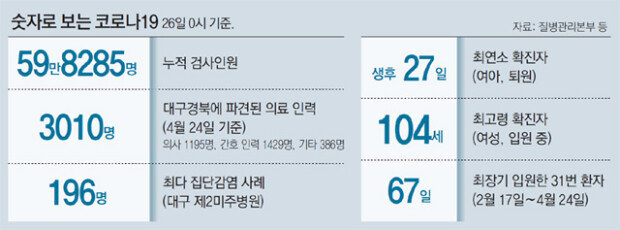Experts warn of high chance for COVID-19’s resurgence
Experts warn of high chance for COVID-19’s resurgence
Posted April. 27, 2020 07:37,
Updated April. 27, 2020 07:37

Public health authorities’ monitoring of COVID-19 for nearly 100 days has revealed the virus is more virulent, tenacious than previously predicted. The virus is shown to be an enemy that is much more difficult to deal with in many aspects than existing viruses.
Patient No. 31, who remained hospitalized for the longest period of time in South Korea, demonstrates COVID-19’s robust vitality. The 60-year-old female patient, the first confirmed case in Daegu, was discharged on Friday, 67 days after her hospitalization started on Feb. 17. The patient, a follower of the Shincheonji cult, was considered a “super spreader” as she moved around many different places including church, hospital and buffet restaurant for about 20 days before and after developing symptoms. Daegu has seen the largest number of confirmed patients (6,846 as of Sunday) than any other metropolitan cities and provinces in South Korea.
The fact COVID-19 is a tenacious virus that survives in the body for a long term has been demonstrated in statistics on the duration of treatment. According to the Central Disaster and Safety Countermeasures Headquarters, 29 percent of 249 patients staying at six treatment and living centers nationwide are receiving treatment for more than four weeks as of April 18. Treatment and living centers are facilities that are housing patients with mild symptoms, who do not require hospitalization. It means that despite relatively mild symptoms, they need to receive treatment for a long period of time before complete recovery from the infection. A survey by the quarantine authorities through Friday found that 37 percent of all the cases remained hospitalized for at least four weeks.
Sometimes virus is detected even after antibody is generated in the body. The Korea Center for Disease Control and Prevention said on Wednesday it tested 25 patients who are recovering from infection and found that all of them developed neutralizing antibody, but that 12 of them were still tested positive of the virus. “Generally when antibody is developed, virus is not detected in the body,” Prof. Kim Woo-joo at the infectious diseases department of Korea University Kuro Hospital. “It is a phenomenon unique to the COVID-19 virus that is different from other viruses.”
The number of patients who have been tested positive anew after full recovery has topped 250 in total. The quarantine authority judges the virus that was completely removed from the body most likely has been revitalized due to deteriorated immunity of the patient or other reasons.
Citing such characteristics of the virus, experts are issuing warnings repeatedly that South Korea could see the resurgence of the COVID-19 virus. “When no confirmed patients emerged for several days before the mass infection in the Shincheonji church in Daegu, there was optimism that ‘the epidemics might have ended’ but mass infection occurred eventually,” KCDC Director Jeong Eun-kyeong said in her daily press briefing on Sunday. “As most Koreans do not have immunity against COVID-19, everyone can develop the disease once exposed to the virus, and in this light, a ‘super spreading incident’ can happen anytime.”
The quarantine authority speculates that there could be many latent cases that only entail mild symptoms among young people. The government plans to include COVID-19 in the list of diseases subject to constant monitoring of severe respiratory disease patients, which is centered on 13 Grade-1 general hospitals nationwide, and expand corresponding hospitals to more than 40. “The only way to prevent the COVID-19 outbreak is to make ‘social distancing part of our daily life’ until a treatment or vaccine is developed,” said Jeong Ki-seok, professor of the respiratory diseases department at Hallym University Medical Center.
Mee-Jee Lee image@donga.com · Young-Hun Jang jang@donga.com
Headline News
- Med professors announce intention to leave hospitals starting Thursday
- Bridge honoring Sgt. Moon Jae-sik unveiled in Pennsylvania
- Chief of Staff Chung tells presidential secretaries to stay away from politics
- US FTC bans noncompete agreements
- N. Korea launches cyberattacks on S. Korea's defense companies







